Meaning of Pentecost Day in the Bible: Holy Spirit
Pentecost Day in the Bible marks the pivotal moment when the Holy Spirit descended upon the apostles, 50 days after Jesus’ resurrection. This event aligns with the Jewish Feast of Weeks (Shavuot), transforming it from an agricultural festival to a cornerstone of Christian theology.
The apostles, once timid, were empowered to preach boldly in various languages, symbolizing the global mission of the Church. Peter’s sermon at Pentecost tied these miraculous events to Old Scriptures prophecies, emphasizing the fulfillment of divine promises.
The birth of the Christian Church and the commencement of its evangelistic mission were pivotal outcomes, opening avenues for deeper theological exploration.
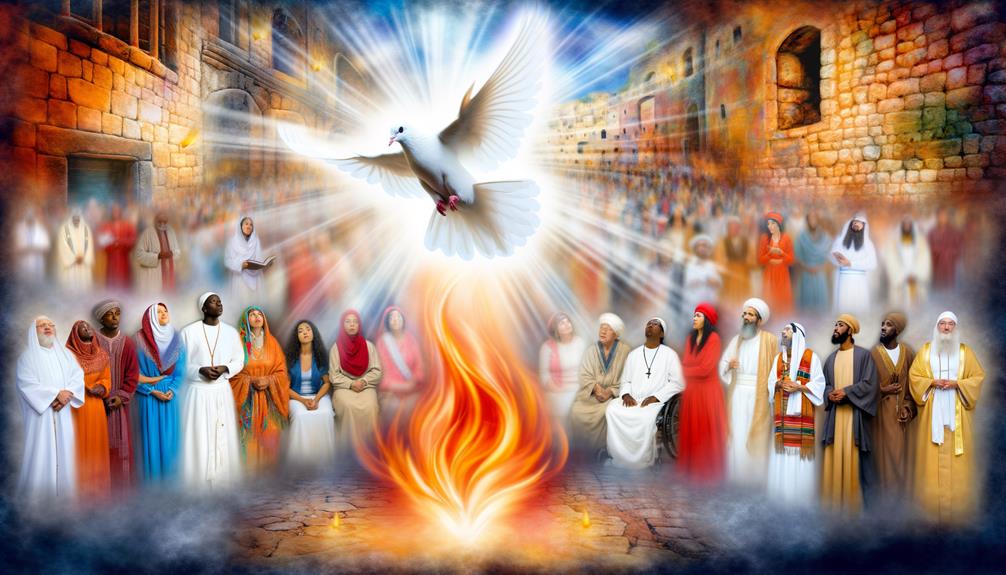
Meaning of Pentecost Day in the Bible: Outpouring of the Holy Spirit, Birth of the Church, and Spiritual Harvest
| Aspect | Biblical Meaning |
|---|---|
| Outpouring of the Holy Spirit | Pentecost marks the day when the Holy Spirit was poured out on the apostles and followers of Jesus. It signifies the fulfillment of Jesus’ promise to send the Helper and the empowerment of believers (Acts 2:1-4). |
| Birth of the Christian Church | Pentecost is considered the “birthday” of the Christian Church. On this day, the apostles began preaching the Gospel, and about 3,000 people were baptized, marking the start of the church’s mission to spread the message of Jesus (Acts 2:41). |
| Celebration of the Harvest & First Fruits | Pentecost, originally a Jewish festival known as the Feast of Weeks (Shavuot), was a celebration of the first fruits of the harvest. It symbolizes spiritual harvest and the first fruits of the church through the coming of the Holy Spirit (Leviticus 23:15-17). |
| Unity & Empowerment | On Pentecost, believers from different nations were united through the power of the Holy Spirit, who enabled them to speak in different tongues. This event represents the unity and empowerment of believers to spread the Gospel worldwide (Acts 2:5-11). |
| Fulfillment of Prophecy | The events of Pentecost fulfilled Old Testament prophecies, such as Joel 2:28-29, which spoke of God pouring out His Spirit on all people. It affirmed God’s plan for salvation and the spread of His Kingdom (Acts 2:16-18). |
Origins in the Old Testament

In the Old Scripture, the origins of Pentecost, also known as the Feast of Weeks or Shavuot, are intricately linked to the agricultural cycle and the covenantal relationship between God and Israel.
This feast, celebrated seven weeks after the beginning of the grain harvest, marks the conclusion of the barley harvest and the commencement of the wheat harvest. It is first mentioned in Exodus 34:22 and elaborated in Leviticus 23:15-21, where it is described as a time of thanksgiving and offering of firstfruits to God.
Shavuot also commemorates the giving of the Torah at Mount Sinai, emphasizing the dual significance of agricultural prosperity and divine revelation.
Consequently, Pentecost embodies both agrarian gratitude and spiritual renewal within the Judaic tradition.
The Pentecost Event
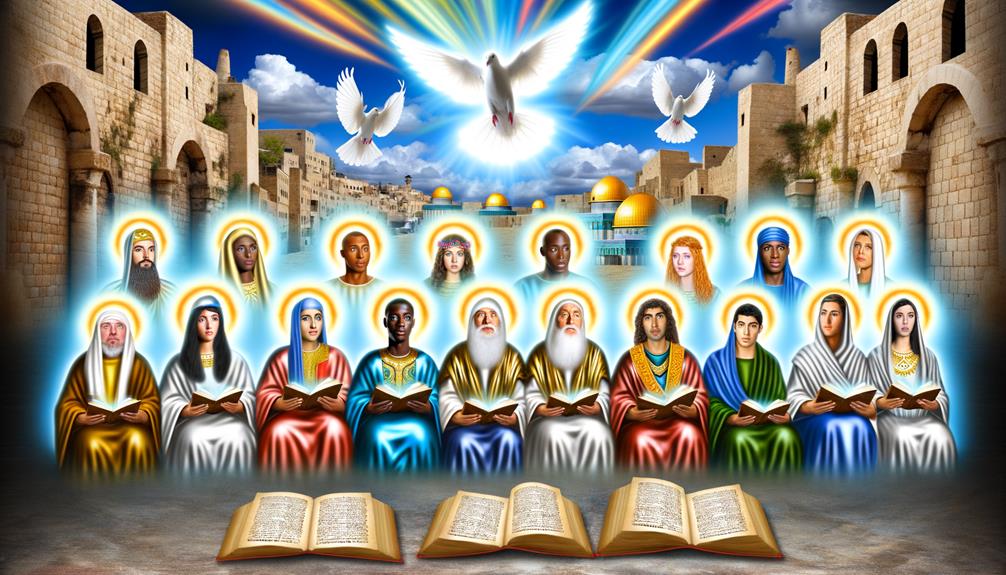
The Pentecost Event, as depicted in the New Scriptures, represents a pivotal moment of spiritual transformation and communal empowerment for the early Christian church. Occurring fifty days after the resurrection of Jesus, Pentecost marks the fulfillment of Jesus’ promise to send a helper, embodying the shift from a group of followers to a mission-driven community. The event is foundational in ecclesiology, highlighting themes of unity, divine presence, and the birth of the church.
| Aspect | Description | Significance |
|---|---|---|
| Timing | Fifty days after Easter | Aligns with Jewish Feast of Weeks |
| Participants | Apostles and early believers | Core group of future church leaders |
| Outcome | Empowerment of believers | Initiates global missionary endeavor |
This transformation underscores the inception of a new covenant community.
The Descent of the Holy Spirit
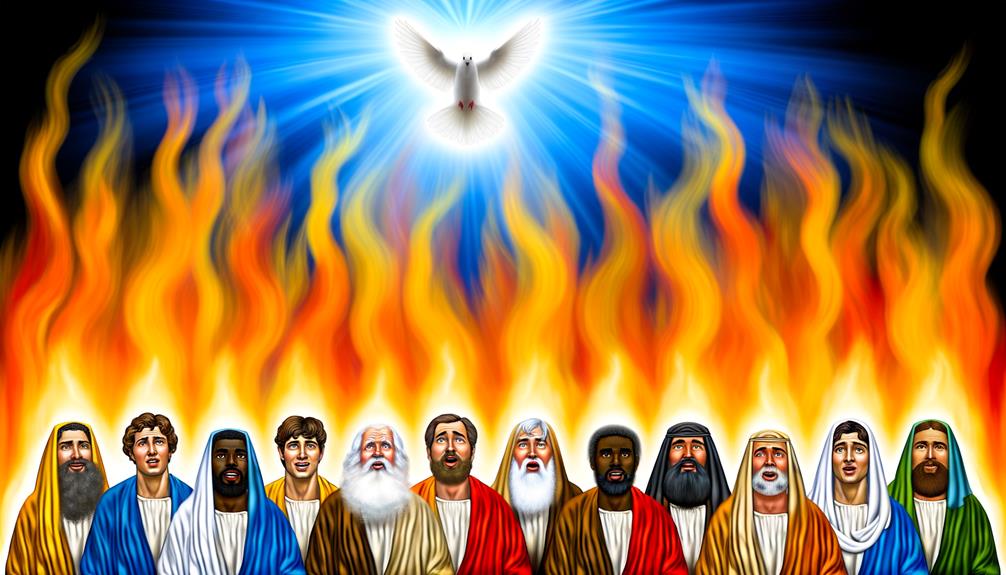
Amidst a gathering of the apostles and early believers, the Holy Spirit descended with a sound like a mighty rushing wind, signifying a profound divine intervention. This pivotal event, as detailed in Acts 2:1-4, marks the fulfillment of Jesus’ promise of the Advocate and signifies the inauguration of the Church.
The phenomenon was accompanied by visible tongues of fire resting on each individual, symbolizing purification and empowerment. The immediate result was the apostles speaking in diverse tongues, enabling them to communicate the gospel universally.
This descent underscores the shift from the Old Covenant to the New, illustrating the Holy Spirit’s role in guiding, equipping, and unifying believers for the mission of disseminating divine truth.
The Apostles’ Transformation
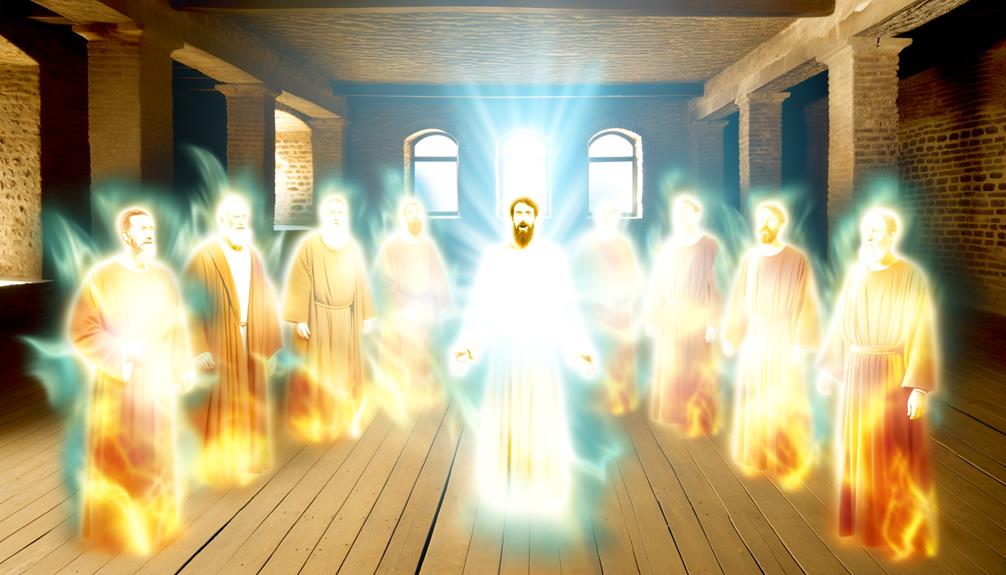
Following the descent of the Holy Spirit, the apostles experienced a profound metamorphosis, evidencing newfound boldness and eloquence in their proclamation of the gospel.
This transformation is conspicuously illustrated in the Acts of the Apostles, where previously timid and uncertain disciples become assertive evangelists.
The Greek term ‘parrhesia’ encapsulates this newfound courage, signifying free and confident speech.
Their speech, now imbued with divine inspiration, transcended linguistic barriers, enabling communication with a diverse audience.
This phenomenon, known as glossolalia, not only validated their message but also symbolized the universal nature of the gospel.
Consequently, the apostles’ transformation underscores the empowerment provided by the Holy Spirit, marking a pivotal shift in their ministry and the early Christian movement.
Peter’s Sermon

In a moment of profound theological significance, Peter delivered a sermon that elucidated the fulfillment of Old Scriptures prophecies through Jesus Christ. This sermon, recorded in Acts 2, marked a pivotal moment in early Christian history. Peter, empowered by the Holy Spirit, connected the miraculous events of Pentecost with the prophecies of Joel and the messianic lineage of David, affirming Jesus as the promised Messiah. The exegetical depth of Peter’s sermon is evident in its structured argumentation and theological clarity, revealing the continuity between the Hebrew Scriptures and the advent of Christ.
| Aspect | Detail |
|---|---|
| Speaker | Peter |
| Scriptural Basis | Joel’s prophecy, Psalms of David |
| Key Message | Jesus as the fulfillment of Messianic prophecies |
| Outcome | Conviction and conversion of the audience |
This carefully crafted sermon serves as a cornerstone for Christian doctrine.
The Birth of the Church
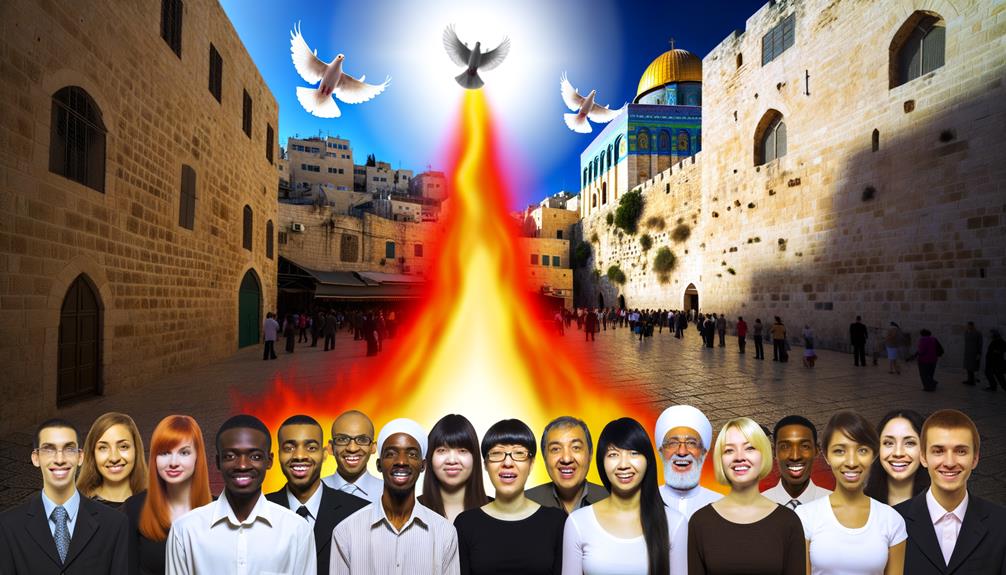
The events of Pentecost, as described in Acts 2, signify the inception of the Christian Church, characterized by the outpouring of the Holy Spirit and the communal formation of believers.
This moment marks a pivotal shift from a dispersed group of followers to a unified ecclesiastical body.
The descent of the Holy Spirit manifested through tongues of fire and miraculous speech, symbolizing divine empowerment and inclusivity.
The communal life, as depicted in Acts 2:42-47, underscores the foundational aspects of teaching, fellowship, breaking of bread, and prayer.
This nascent community exemplified a radical new way of living, rooted in shared resources and mutual care, thereby establishing the ecclesiological framework that would define Christian identity and praxis.
Fulfillment of Jesus’ Promise

As the nascent Christian community began to embody the principles of fellowship and shared life, the events of Pentecost also marked the realization of Jesus’ promise to send the Holy Spirit as a Comforter and Guide.
This pivotal moment is captured in Acts 2:1-4, where the apostles were filled with the Holy Spirit, enabling them to speak in diverse tongues. This phenomenon was not merely miraculous but also fulfilled several key aspects of Jesus’ promise:
- Empowerment for Witnessing: The apostles received the courage and ability to spread the Gospel.
- Spiritual Gifts: Manifestations such as speaking in tongues symbolized the bestowal of divine gifts.
- Divine Presence: The indwelling of the Spirit signified God’s continued presence among believers.
Theological Significance
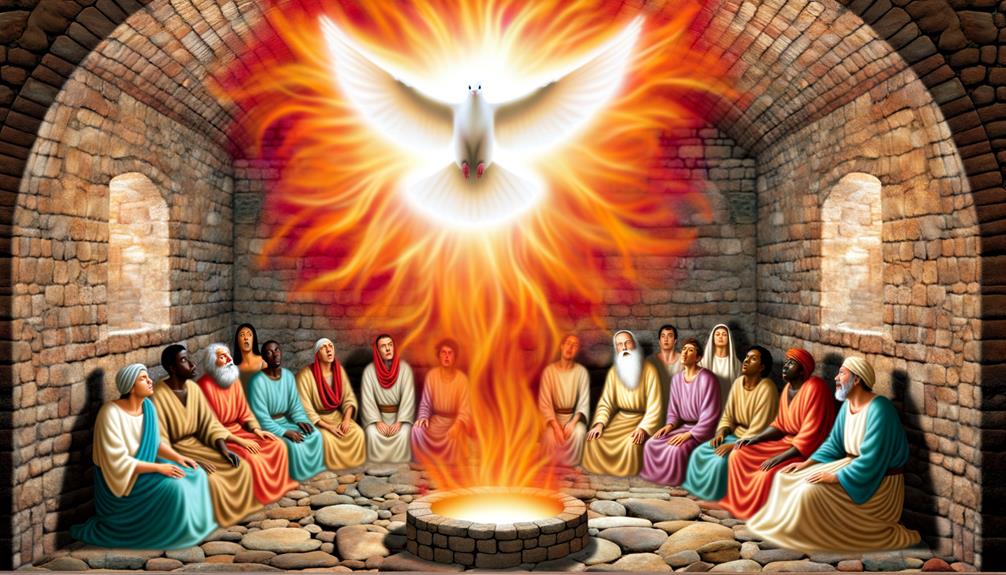
Pentecost Day holds profound theological significance as it encapsulates the transformative power of the Holy Spirit in establishing the early Church and validating the New Covenant.
The event, documented in Acts 2, marks the fulfillment of Old Scripture prophecies, particularly Joel 2:28-32, by demonstrating the outpouring of the Spirit upon all believers, transcending ethnic and social boundaries.
This divine act initiates a new era of salvation history, characterized by the indwelling presence of the Holy Spirit, which empowers believers for ministry and mission.
Theologically, Pentecost underscores the Trinitarian nature of God’s redemptive plan and reaffirms the continuity and fulfillment of biblical promises, thereby cementing the foundational truths upon which Christian doctrine is built.
Pentecost’s Impact on Christianity
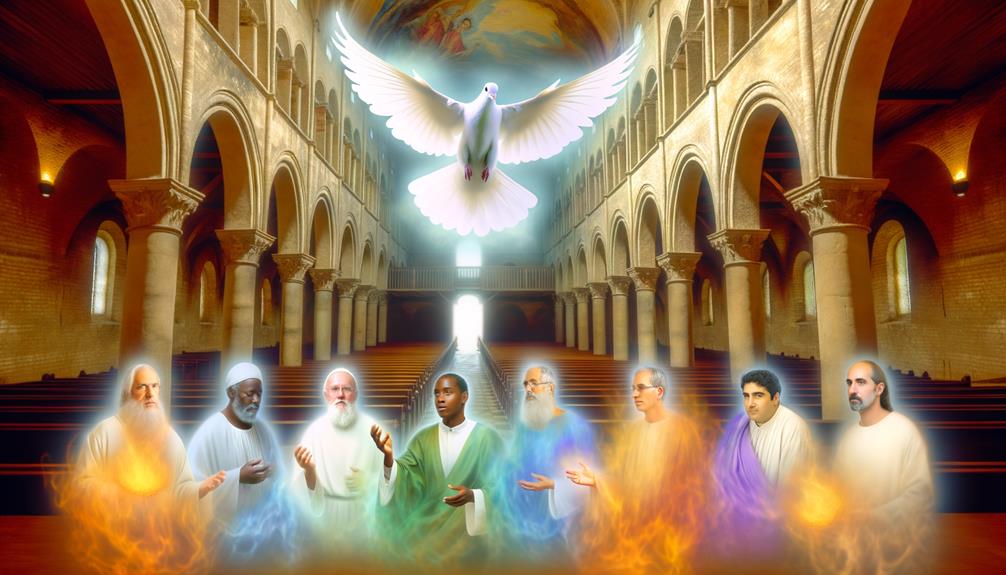
Pentecost is often regarded as the birth of the Christian Church, marking the moment when the Holy Spirit descended upon the apostles as described in Acts 2:1-4.
This event not only empowered the apostles to preach the gospel in various languages but also initiated the spread of Christianity beyond Jewish communities.
The theological implications of the Holy Spirit’s descent underscore the transformative and unifying aspects of this pivotal event in Christian history. The Holy Spirit’s descent at Pentecost not only symbolizes the empowering of the early disciples but also represents the ongoing presence and guidance of the Spirit within the Christian community. This event, as described in Acts 2, is foundational for understanding the role of the Holy Spirit in the life of believers and the mission of the church. The biblical interpretation of 123 123 highlights the significance of Pentecost as a moment of spiritual renewal and empowerment for all who profess faith in Christ.
Birth of the Church
The event commonly referred to as Pentecost marks a pivotal moment in Christian history, signifying the establishment of the early Church through the descent of the Holy Spirit upon the apostles. This transformative episode is foundational for understanding the Church’s origin, function, and mission. It is vital to take into account the following aspects:
- Apostolic Empowerment: The apostles were endowed with the ability to preach in various languages, facilitating the spread of the Gospel.
- Communal Genesis: The experience fostered a sense of unity and shared purpose among the nascent Christian community.
- Theological Foundation: Pentecost established key doctrines concerning the Holy Spirit and ecclesial authority.
Understanding these facets is essential for comprehending Pentecost’s enduring impact.
Holy Spirit’s Descent
Empowered by the descent of the Holy Spirit, the apostles experienced a profound transformation that markedly shaped the theological and missiological trajectory of early Christianity.
This event, recorded in Acts 2, signifies the fulfillment of Jesus’ promise of a Paraclete, providing the apostles with divine guidance and the ability to speak in various tongues.
Theologically, this moment underscores the Holy Spirit’s role in empowering believers, facilitating the spread of the Gospel beyond Jewish boundaries, and unifying diverse groups under the nascent Christian faith.
Missiologically, the Holy Spirit’s descent catalyzed the apostles’ evangelistic fervor, enabling them to preach with unprecedented boldness and effectiveness, thereby laying the foundational framework for the global expansion of Christianity.
Conclusion
Pentecost stands as a pivotal event in Christian theology, akin to a cornerstone in a grand architectural edifice. It marks the fulfillment of Old Scriptures prophecies and Jesus’ promises, signifying the descent of the Holy Spirit and the Apostles’ subsequent transformation.
Peter’s sermon catalyzed the birth of the Church, thereby initiating a paradigm shift in religious history. The theological significance of Pentecost continues to permeate Christian doctrine, underscoring its enduring impact on the faith’s evolution.






